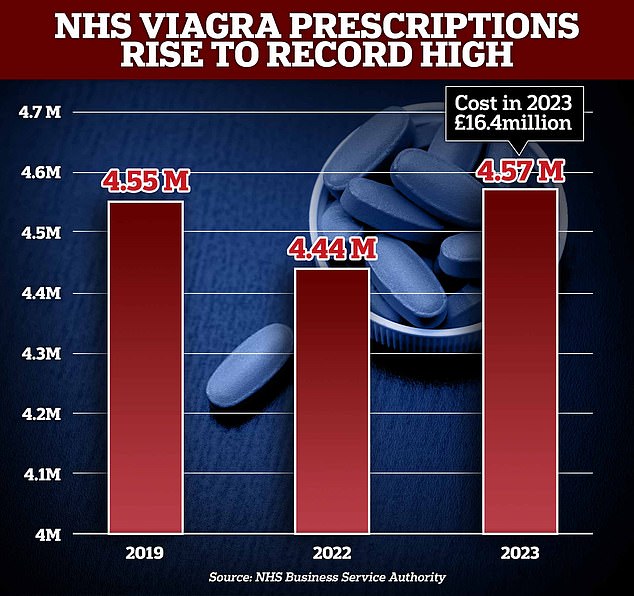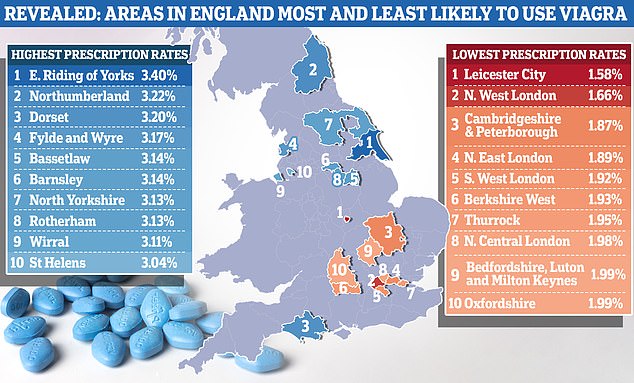Warning over rise in counterfeit Viagra pills that could be contaminated with toxic chemicals being sold to British men
Dodgy Viagra is now Britain’s biggest counterfeit drug; last year, more than £6.2 million worth of dodgy little blue pills were seized by British regulators.
The sum means that more supplies of the erection drug have been seized than knock-off versions of painkillers such as morphine.
Health officials said online retailers flouting regulations were behind the counterfeit products, most of which were imported from countries such as India without proper authorization.
Data from the British regulator The Medicines and Healthcare products Regulatory Agency (MHRA) shows that 2.6 million doses of sildenafil, the generic name for the drug best known as Viagra, were seized last year.
Another half a million doses of tadalafil, another erectile dysfunction drug sold under the brand name Cialis worth £1.2 million, were also seized.
Dodgy Viagra is now Britain’s biggest counterfeit drug; last year, more than £6.2 million worth of dodgy little blue pills were seized by British regulators. Stock image
Andy Morling, head of enforcement at the MHRA, said The sun that many men look for cheaper medicines online or try to avoid going to a physical pharmacist out of shame.
“Online is the new frontline, this is almost exclusively an online business,” he said.
‘There are tens of thousands of websites worldwide and many of them are sold in sterling and shipped to Britain.’
TV pharmacist Thorrun Govind added that the consequences of buying unreliable medicines could be catastrophic.
“Fake medicines may not contain any of the active ingredients and may contain ingredients that are harmful to your health,” she said.
Medicines sold on physical shelves in Britain must undergo strict quality control to ensure people can use them as safely as possible.
While all medications carry potential side effects, medications from unreliable sources may not work or contain additional ingredients or contaminants such as heavy metals or other medications that could be dangerous.
Another reason to avoid buying chemical bedroom aids online is that the pills themselves can be dangerous.
Not all men, such as those with heart problems, should take medications like sildenafil due to the potential impact the drug can have on the organ.
Reputable pharmacists will ask men who are interested in taking medications like Viagra for this reason a few questions about their health.
However, not all men are advised to take medications like sildenafil; for example, people with heart problems are warned not to use it.
In total, The Sun reported that the MHRA stopped 15.5 million illegal doses of medicine, worth £30 million reaching Britons in 2023.

In 2023, a total of 4.57 million prescriptions for sildenafil, better known by the brand name Viagra, and other types of impotence drugs sold under the brand names Cialis and Levitra, were distributed by the health care system.
Painkillers and tranquilizers were the most common medications seized after erectile dysfunction medications.
It comes as data suggests millions of British men are now using the libido-boosting drug.
A total of 3 million prescriptions for sildenafil for erectile dysfunction were issued by the NHS in 2023 alone.
This doesn’t stop many other Brits buying it without a prescription from big box stores or online pharmacies, with some options costing as little as a penny per pill.
Separate data, released earlier this year, suggests that sildenafil use varies from country to country.
That data suggested that men in Yorkshire were the most likely in England to need help in the bedroom, with 3.5 percent of men in East Riding prescribed sildenafil last year.

This map shows the areas where people were most and least likely to be prescribed sildenafil, the key ingredient in the NHS erectile dysfunction drug Viagra
This was followed by men in Northumberland and Dorset, who each came second and third in terms of prescription rates for the erectile dysfunction drug, each at around 3.2 per cent.
The Yorkshire region appeared to be particularly hard hit by impotence, with the towns of Rotherham, Barnsley, Harrogate, Scarborough and Whitby ranking in the top 10 areas for Viagra prescriptions.
At the other end of the spectrum, men in Leicester City seemed the least likely to need help from the little blue pill to maintain an erection, with a prescription rate of just 1.6 percent.
Although the vast majority of people taking sildenafil will not experience any problems, it is estimated that one in 100 patients will experience common side effects as a result of taking the medication.
These include headaches, nausea, hot flushes, indigestion, a stuffy nose and dizziness, according to the NHS.
More serious side effects that require urgent medical care are estimated to occur in fewer than one in 1,000 people.
These include seizures, a prolonged and possibly painful erection, especially for more than two hours, chest pain and in very rare cases a life-threatening allergic reaction to the drug called anaphylaxis.
Earlier this year, MailOnline revealed that popular erection pills such as Viagra have been linked to more than 200 deaths in Britain.
None of the fatalities – all of which have occurred since 1998 – have been proven to have been caused directly by the drugs.
Erectile dysfunction, also called impotence, is expected to affect about half of men over 40.
Although most cases of erectile dysfunction are isolated and not serious, repeated or persistent impotence should be investigated by a doctor.
This is because the problem can be an indicator of serious health problems such as high blood pressure or high cholesterol, diabetes, hormone problems and mental problems such as depression and anxiety.
